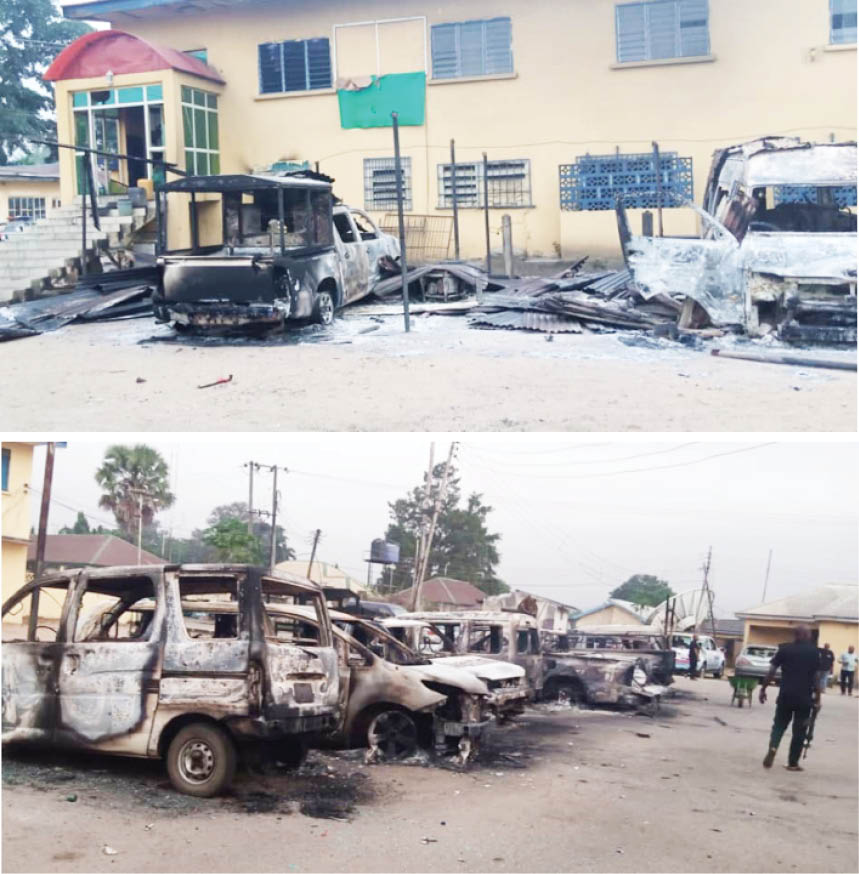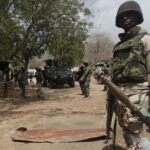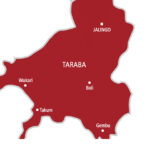On Easter Sunday night, Owerri, capital of Imo State, was like a war zone as gunmen suspected to be members of the outlawed Indigenous People of Biafra (IPOB) attacked the Nigerian Correctional Service (NCS) centre, Owerri, freeing 1,884 inmates. They also razed over 50 vehicles and destroyed buildings at the headquarters of the Imo State Police Command.
Quickly, former Inspector General of Police, Mohammed Adamu, ordered deployment of additional units of Police Mobile Force (PMF) and other Police Tactical Squads to the state to strengthen security and prevent further attacks on security formations or critical national infrastructure.
Force spokesperson, Frank Mba, said “preliminary investigations revealed that the attackers, who came in their numbers with sophisticated weapons such as General Purpose Machine Guns, Sub-Machine Guns, AK49 rifles, Rocket Propelled Grenades, Improvised Explosive Devices, are members of the proscribed Indigenous People of Biafra (IPOB)/Eastern Security Network (ESN).”
President Muhammadu Buhari condemned the attacks, calling them “act of terrorism.”
Buhari, in a statement by his spokesperson, Garba Shehu, directed security and intelligence agencies in the state and the geo-political zone to fully mobilize and go after the “terrorists, apprehend them and get them punished under the full weight of the law.”
That attack was just one of the many that have been witnessed in the region. And even after that, many others have occurred almost on a daily basis. The upsurge in targeted killings in the South-east is unsettling and should be taken very seriously. In February, gunmen burnt a police station and four patrol vehicles at Isu, Onicha Local Government Area (LGA) of Ebonyi State.
Also, about 200 ‘hoodlums’ armed with AK-47 rifles attacked Abayi police station, Osisioma Ngwa LGA of Abia State, killing two officers.
In March, about 20 gunmen attacked a police patrol team along the Nimo-Neni link road in Anaocha Local Government Area of Anambra State. In the encounter, a policeman was shot dead while another sustained gunshot injuries.
Shortly after, four naval personnel and a policeman were killed in Anambra State. The same week, gunmen attacked a vehicle of the Nigerian Correctional Service (NCS) conveying some inmates to court, in Aguata LGA, Anambra State, killing two security personnel. These are just some of the attacks as the list goes on and on.
Shortly after the prison attack, Vice President Yemi Osinbajo and former Inspector-General of Police, Muhammed Adamu, visited the state to inspect the damage on NCS centre and the police command headquarters.
We condemn the attacks on security personnel and civilians in very strong terms. It is very unfortunate that the crisis in the region was allowed to degenerate to this level. It is also very disheartening that security alerts on possible attacks were ignored by the governors and other relevant authorities.
It is important to note the significance of these incidents; no Nigerian is safe anywhere in the country if policemen are under attacks and can, therefore, no longer carry out their duties. It is also very worrisome that the arms of the police personnel are carted away during these attacks. This means that while the security personnel run short of arms, the enemies of the state get more equipped and that is very dangerous. The business as usual approach of both federal and state governments to issues has emboldened the perpetrators of these acts. The authorities must change tactics and rise to the occasion immediately, as the development is eroding trust in the ability of federal and state governments to secure the people.
The nation cannot afford insurgency in the South-east. Already, it is battling that of the North-east, where many people have been killed and properties worth billions of naira, destroyed. The federal government should tackle this situation. It should work with all stakeholders in the region to fashion out a way out. It should ensure that those fueling the crisis and their sponsors are dealt with. The government should also work out modalities for the compensation of families of the slain security personnel.
The governors of states in the region should be more proactive and not pay lip service to security issues. The inability to take charge of their states as Chief Security Officers is the greatest betrayal of their people’s trust and mandate. This is the time for right deployment of their security votes. They should also work closely with security personnel and avoid politicizing the issue.
More importantly, we appeal to Nigerians in other parts of the country not to play into the hands of the group by seeking vengeance for the killings of their kinsmen through reprisals as that will only escalate the situation. They should, instead, allow the law to take its course. Residents who have useful information should avail the police and other security agencies with them to help identify and arrest the perpetrators.
We also call for a robust inter-agency cooperation to avoid a repeat of the Owerri experience where gunmen operated for hours without police or military intervention, or reinforcement.

 Join Daily Trust WhatsApp Community For Quick Access To News and Happenings Around You.
Join Daily Trust WhatsApp Community For Quick Access To News and Happenings Around You.


